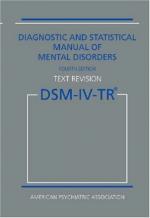|
This section contains 163 words (approx. 1 page at 300 words per page) |
Imprecise term, primarily used by laypeople, to refer to mental conditions.
This term is widely used, but has no precise definition. In fact, many mental health professionals feel the implied distinction between mental and physical disorders oversimplifies the reality. There is considerable research into the physical aspects of mental disorders and, alternatively, the mental aspects of physical disorders. Mental disorder has been defined as a behavioral or psychological syndrome that is associated with distress or disability (ability to function normally in activities of daily living) or with an increased risk of pain, disability, loss of freedom, or death. The classification of the person (schizophrenic, bulimic, alcoholic) with the disorder is common in everyday discourse, but professionals stress that it is more accurate to classify the disorder (e.g., schizophrenia, bulimia, alcoholism) rather than the individual who has it. In addition, classification of a mental disorder does not imply that the condition does not have physical and/or biological components.
|
This section contains 163 words (approx. 1 page at 300 words per page) |


